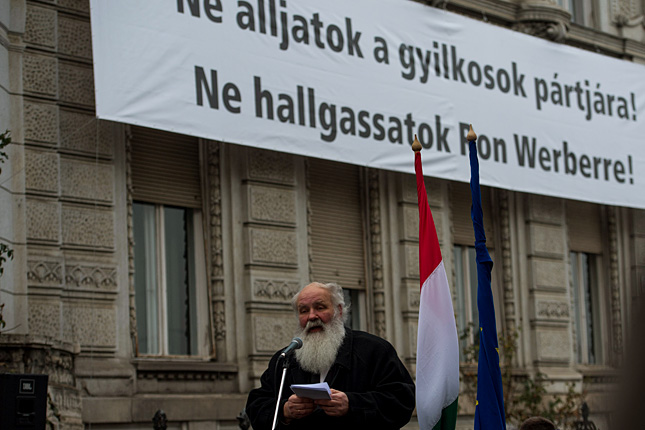Hungary is such a great place because there's just not a single day without some memorable news, idea, or comment - mostly, though by far not only, from within the conglomerate that rules the country today.
To prove the point, here comes a selection from the last three days' harvest.
- László Kövér, Speaker of the Parliament and a major figure in Fidesz (we had him already
here) said that it would be much better to rule by decree. In his view, the current way of governing that is bound by laws is, erm, outdated. And it had been created after the systemic change in 1990 out of fear of dictatorship, which fear is by today obsolete.
(Now tell me, could Kafka, Vonnegut or Monty Python have gotten up with anything like this? By the way, this is the same reasoning they employed when they destroyed the Constitutional Court. Then they said the Court had been important in times when the rule of law was unstable, but now it is firm so... the Court can be done away with. And everyone knew they were crushing the Court in order to be able to pass retroactive laws.)
- Ethics. Ethics is very important for the government. So important that it has been introduced as a mandatory subject in lower education. Complete, of course, with detailed mandatory curriculum and a uniform teaching book to be used in all schools across the country. And that has delicacies such as:
"Hungarians are one of Europe's most open-minded, welcoming and friendly nations, hower the many adopted nations teared the country apart"
- The famous
Pető Institute has financial difficulties so severe that it is near bankruptcy. The institute is the center of educating specialists who treat children with various disabilities with the Pető method. At the same time, the state is building expensive football stadiums en masse. See, PM Orbán likes football. And he doesn't like
gay things such as inclusive therapy. Or humanities.
- Quite in the above spirit, Lajos Kósa, also a senior Fidesz politician, said in a school's yearstart celebration: "
good children, when beaten, tend to perform" The audience stood up and left. (I'm joking, of course the audience did nothing, except clap-clap)
- And, PM Orbán's daughter got married. The lucky winner is the son of a local Fidesz nobility, and got elected into the management of the regime's favourite company (producing a stunning 99% winning ratio in the public procurements they competed for. Basically they biuld everything in today's Hungary).
Notably, the roads on which the pair would drive on the day of the wedding, were repaired with great haste by the authorities.
...and, as said, this is the harvest of three short days, in contemporary Hungary.

